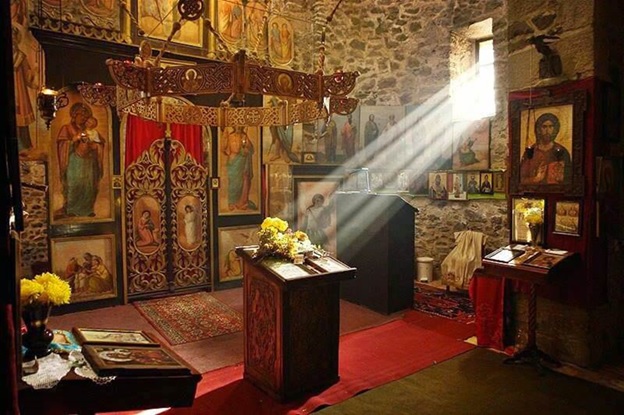Who experience the mystery of the Church?
9 February 2022The Church of Christ on earth is preeminently a divine revelation. It wasn’t revealed as a divine sign the aim of which would have been to pass on a message of salvation, but was founded as a revelation in order to function on earth and to be directly linked with the Church triumphant, together with which it constitutes the one Church of Christ, which saves eternally. It is founded by God and is his living body. It’s also the Church of revelation and supernatural signs which verify the truth of the whole of its teaching and its liturgical life. They make it an inheritance and people on earth. The first has the Apostolic succession and the pastoral care of souls. The latter has spiritual freedom and also the privilege of the blessing of divine providence so that it, too, is not deprived of leadership.
The whole of the Church is the mystery of mysteries. Those who live this mystery, really do experience the Church and acquire a spiritual foretaste, sometimes even tangible, of paradise, depending on the measure of their Christian life. All the saints whose lives we know, especially the Fathers of the desert, spoke of a taste of paradise, especially Saint Paul, who describes the event so vividly (2 Cor., 12, 1-10).

These divine experiences gave them the strength to continue their struggle and to live even more intensely the mystery of the Church, as time went by. Of course, they can’t describe what they experience, because it’s lived. It can’t be described. There aren’t words to describe it. This is why Paul said of his experience: ‘And I know a man in Christ- who was caught up to paradise and heard inexpressible things, things that no one is permitted to tell’[v. 4].
The mystery of the Church is experienced only by those who are consistent in their Church life. Observance of the commandments, sobriety, ascetic effort, participation in the sacraments, and the unwavering attempt to keep to the triptych of purification, illumination and glorification. The mystery of the Church has been experienced by people of all classes and eras, all those who have made their way on the basis of the above genuine features of the life in Christ. From Patriarchs and Emperors down to the last insignificant striver, whom God alone knows, whether they live in the desert or the world. This is what we’re taught by the lives of the saints and holy tradition. Conclusion: neither high office nor obscurity nor anonymity are a hindrance: ‘so that every mouth may be silenced’ (Rom. 3, 19). That is to stop every mouth on the day of judgment as being without defense.
A high official in the Church may, because of his office, celebrate the sacraments, teach, administer a large part of the Church, even look after saints who are within his jurisdiction and who are properly obedient to him and honor him, but may not be at peace in his heart because of a lack of divine grace. He himself might have a painful void within himself. He may not have an inner spiritual life, essentially dying and going to his punishment. Had he not been completely taken up with vanities and administration, but had lived an inner spiritual life, he’d have been full of gifts, and grace would have imbued his every liturgical, educational and administrative action. Then, as a result of his office his spiritual harvest would be great for all his flock, and he himself would experience the mystery of the Church without a void in his soul.

Or again, there may be an ordinary person, whom nobody pays any attention to, who lives their life in Christ simply and humbly. They submit to the commandments of the Church, honor the bishops, even the unworthy ones; they receive an abundance of grace and in the end are sanctified.
God follows the life of each of us and, as a righteous judge renders to each according to their works. This ‘each of us’ indicates something to be expected in our personal life during our time on earth. It has to do with the divine judgment, the premises for each of us for the struggle and the harvest. Those who are constantly involved on a daily basis with divine matters, but remain without fruit will be judged differently from those who don’t have this opportunity, but who have shown practical love for God and their neighbor and have striven against sin.






